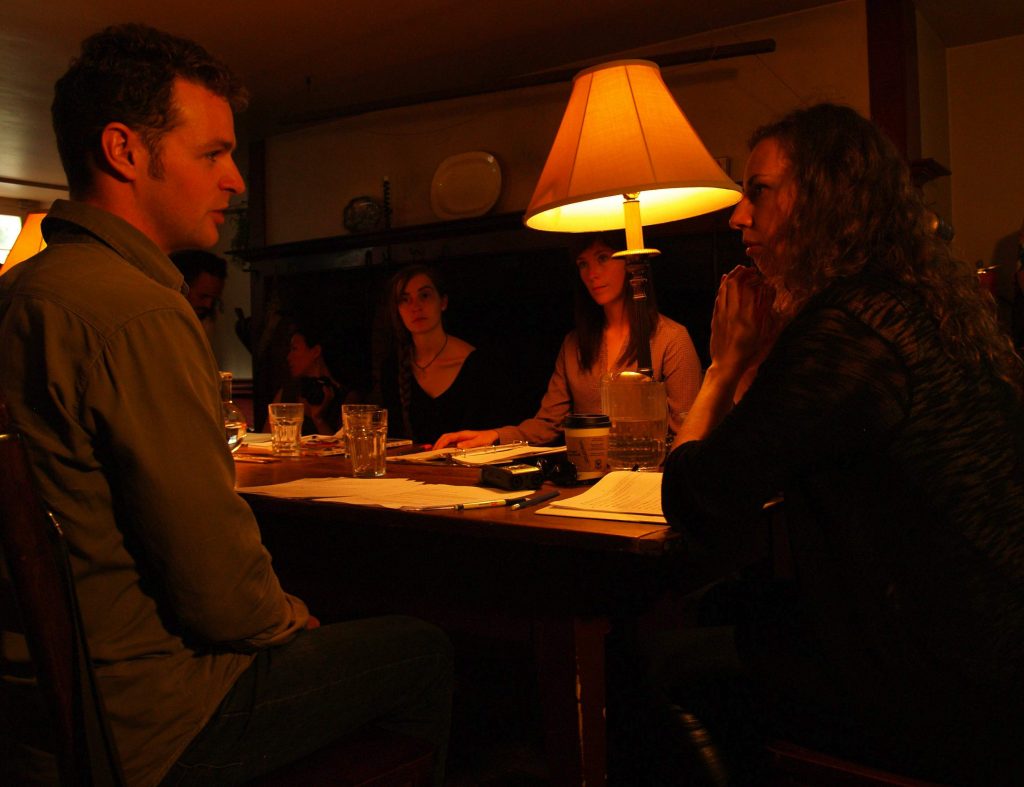More empathy, more compassion, and more connection
August 26, 2013
By Kevin Burns

Natalie Feheregyhazi – Courtesy of Apuka Theatre
One hundred and twenty five years ago, in August 1888, in the expectation of negative audience reaction, August Strindberg tried to explain what he was trying to achieve with his new play, “Miss Julie.” In the Preface of the published edition he wrote: “I have not tried to accomplish anything new but merely to modernize the form according to what I believe are the demands a contemporary audience would make of this art.” Today, this same commitment to adapting a traditional art form in order to engage contemporary audiences is what drives Natalie Feheregyhazi’s reworking of Strindberg’s controversial play. She is not interested in recreating theatre as a museum piece. Instead, she wants to stage an intense theatre event outside the traditional confines of a conventional theatre.
This new production, by Toronto’s Apuka Theatre, keeps the play in the nineteenth century but has modified the title – “Lady Julie” – to underline the importance of class and status and their influence on the various “upstairs/downstairs” members of Miss/Lady Julie’s household. The location for this production is not a performing arts space but the Georgian-style Campbell House, built in 1822, the oldest surviving structure from the pre-Toronto Town of York, and which now operates as a community museum.
Strindberg set his play in the kitchen of a large family dwelling, knowing that the stage conventions of his day would have included an illusion-creating set with canvas walls and with pots and pans painted on a backdrop. Not so with this new version. This intense, erotically-charged play about male/female manipulation, power struggles, and strict class distinctions is being staged in the kitchen of Campbell House, full of genuine cooking equipment from the nineteenth century. An audience capacity of about 30 in this still-functioning kitchen makes for a very “up-close and personal” engagement with Strindberg’s intense stage conflict.

Apuka Theatre rehearsal of Lady Julie - Courtesy of Apuka Theatre
Natalie Feheregyhazi has adapted Strindberg’s original script and also performs the title role in this production, which is directed by Apuka Theatre’s Rod Ceballos. Feheregyhazi says: “Here we have the exact setting that Strindberg was seeking. We have a working kitchen where we can use the pots. We can use the furniture. It has a working fireplace and we will be cooking the meals. There will be smells. We’re trying to keep everything authentic.”
Would Strindberg recognize his play?
Listen to Natalie Feheregyhazi describe how she adapted his work.
Runs: 2:02
As a performer and a playwright she is interested in theatre and realism. “The goal is to reflect as accurately as possible the stories of the characters, their world, their environment, and all the factors that come into play in their stories. The only way to do that is to select plays that deal with real themes in real ways, with real characters that we can identify with in the world and allow that kind of voyeuristic quality to come in where the audience can that know they are experiencing a snapshot of another human being’s life. We need that. We need to have more empathy for one another. We need to have more compassion. We need to be more connected to one another and, for me, theatre is one of the best ways that I know to do that and to share that with people.”
Given the misogyny that Strindberg explores in this play, Apuka Theatre has made an arrangement with Ernestine’s, a woman’s shelter founded in 1983 in Toronto. Ernestine’s will receive proceeds from this production. Aligning this play with a shelter for women escaping from abusive circumstances was both a natural and deeply personal decision for Natalie Feheregyhazi, who is very open about her own experiences of an abusive relationship. “That relationship was one in which I didn’t know if I would make it out of it alive, and what I held on to was this, you know, hope. Because you get out of it, past the first step. You’re out, like the women who end up in shelters. But what’s the next step? Your equilibrium is completely thrown off. You don’t know who you can trust. You don’t know what’s real. You have no grasp on reality and you are being asked to have faith in strangers or to start completely fresh. That’s what led me to partner this play with a shelter.”
Many of the women who seek shelter in Ernestine’s are immigrants, something else that Feheregyhazi relates to in personal way. She is the daughter of the acclaimed Hungarian-born theatre artist, Tibor Feheregyhazi, who arrived in Canada in 1957. Slowly, and successfully, he reinvented himself as an English speaking Canadian theatre artist, directing plays at the Manitoba Theatre Centre in Winnipeg, Magnus Theatre in Thunder Bay, and Persephone Theatre in Saskatoon. “What I find myself thinking about as a child of someone who immigrated to Canada, I think of these women coming over with their husbands and something goes wrong in this new country. Who do they turn to? What are their social networks? I think about my father when he came over. He didn’t speak English. Do they speak the language? Do they know the laws?”
What’s the mission of Apuka Theatre?
Listen to Natalie Feheregyhazi explain the company’s mission.
Runs 1:32
Natalie Feheregyhazi is continuing in her late father’s theatrical footsteps and shares the same drive to use theatre not only as a form of self-expression, but also as a means of social transformation. “When I think about my dad, I think about his coming to this country, the circumstances under which he came, and in being completely isolated. And I think about my own experiences, for different reasons, of feeling isolated. I think it makes a lot of sense to connect so strongly and so personally to something like theatre because there’s a built-in community there. … Theatre gives an opportunity to take an hour or two of respite from life, lock it out, and to allow ourselves to sit with our emotions, our feelings, our thoughts. And when I think about my father, what I learned from him, I mean, he went to every performance of every show that went through his theatre. And he launched it and he sat on the sets and he watched it with his actors and he shared it with his audiences. And that’s what I want, every night, to share something profound and significant.”
Natalie describes herself as “a very proud half-Hungarian!” and laughs. “I’m passionate about all things Hungarian, probably in no small part because they connect me to my father and his experiences. As a second generation, though, it’s really hard to know how much of this [theatre] tradition actually comes from Hungary, how much actually comes from the Soviets, how much comes from Saskatchewan, where I grew up, and how much comes from just being Canadian. But it’s ambiguous.” After a brief moment of reflection she concludes, “I am, in a very strong way, the person I am today because of my Hungarian connection and my European roots.”
Lady Julie runs at the Campbell House Museum from September 29 to September 14th, 2013.
For more on Apuka Theatre: www.apukatheatre.com
For more on Campbell House Museum: www.campbellhousemuseum.ca
For more on Ernestine’s Shelter: www.ernestines.ca
For more on Tibor Feheregyhazi, see the main theatre page of our website.
